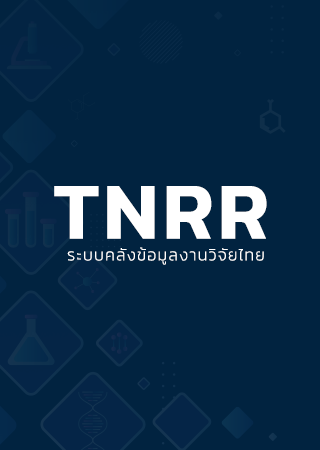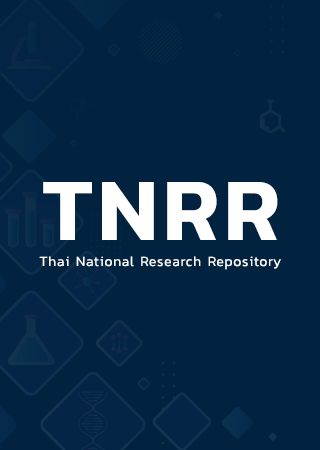Description
บทคัดย่อชื่อวิจัยปัจจัยเชิงเหตุทางจิตลักษณะและสถานการณ์ของพฤติกรรมการเสริมสร้างพลังครอบครัววิถีใหม่ไร้ความรุนแรงของเยาวชนไทย ชื่อผู้วิจัย สุวลักษณ์ อ้วนสอาด อนันต์ แย้มเยื้อน และภีรวัฒน์ นนทะโชติปีที่สำเร็จการวิจัย 2565 ทุนอุดหนุนการวิจัย สำนักงานการวิจัยแห่งชาติสถาบันครอบครัวไทยอ่อนแอจากปัญหาด้านเศรษฐกิจ สังคม การเมือง และสาธารณสุข ดังนั้น รัฐจึงเน้นการเสริมสร้างและพัฒนาศักยภาพทุนมนุษย์ให้สถาบันครอบครัวให้มีความอยู่ดีมีสุขและเข้มแข็งเอื้อต่อการพัฒนาคนและประเทศ บ่มเพาะและหล่อหลอมเยาวชนให้เป็นคนดี คนเก่ง และมีสุขในอนาคต งานวิจัยนี้มีวัตถุประสงค์ 2 ประการ ได้แก่ 1) เพื่อสร้างและพัฒนาเครื่องมือวัดพฤติกรรมการเสริมสร้างพลังครอบครัววิถีใหม่ไร้ความรุนแรงของเยาวชนไทย 2) เพื่อศึกษาปัจจัยเชิงเหตุทางจิตลักษณะและสถานการณ์ของพฤติกรรมการเสริมสร้างพลังครอบครัววิถีใหม่ไร้ความรุนแรงของเยาวชนไทย งานวิจัยนี้เป็นวิจัยเชิงปริมาณ การวิจัยแบบความสัมพันธ์เปรียบเทียบ (Correlational-Comparative Study) กลุ่มตัวอย่าง คือ เยาวชนไทย ใช้วิธีการสุ่มแบบหลายขั้นตอนกำหนดโควตา (Multistage Quota Random Sampling) กลุ่มตัวอย่างจำนวน 800 คน สำหรับการวิเคราะห์วัตถุประสงค์ที่ 1 และกลุ่มตัวอย่างจำนวน 450 คน สำหรับการวิเคราะห์วัตถุประสงค์ที่ 2 พบผลที่สำคัญ 2 ประการจากการวิจัยดังนี้ ประการแรก แบบวัดพฤติกรรมการเสริมสร้างพลังครอบครัววิถีใหม่ไร้ความรุนแรง จำนวน 3 แบบวัด ได้แก่ 1) แบบวัดพฤติกรรมสร้างภูมิคุ้มกันในตน 3 องค์ประกอบ ได้แก่ สติ สัมปชัญญะการใช้สื่อสังคมออนไลน์ การมองโลกในแง่ดี และการพึ่งพาตนเอง 2) แบบวัดพฤติกรรมป้องกันและหลีกเลี่ยงความรุนแรงในครอบครัว 5 องค์ประกอบ ได้แก่ การป้องกันความรุนแรงจากสภาพสังคม การป้องกันความรุนแรงจากสภาพเศรษฐกิจ การป้องกันความรุนแรงจากสื่อสังคมออนไลน์ การหลีกเลี่ยงความรุนแรงจากสิ่งเสพติด และการหลีกเลี่ยงความรุนแรงจากการดำเนินชีวิต และ 3) แบบวัดพฤติกรรมจัดการปัญหาความขัดแย้งในครอบครัว 3 องค์ประกอบ ได้แก่ การสื่อสารอย่างสร้างสรรค์ในครอบครัว การปลูกฝังมารยาทและคุณธรรมในครอบครัว และการสร้างสัมพันธภาพและการให้คำปรึกษาในครอบครัว โดยทั้ง 3 แบบวัด สามารถอธิบายความแปรปรวนได้ 57.05%, 60.50% และ 57.00% ตามลำดับ เมื่อทำการวิเคราะห์องค์ประกอบเชิงยืนยันทุกแบบวัด ปรากฏว่าโมเดลกลมกลืนกับข้อมูลเชิงประจักษ์ ประการที่สอง การวิเคราะห์แบบถดถอยพหุคูณ พบว่า จิตลักษณะเดิม สถานการณ์ และจิตลักษณะตามสถานการณ์ ทั้ง 14 ตัวแปร 1) สามารถทำนายพฤติกรรมสร้างภูมิคุ้มกันในตนได้ 54.70% โดยมีลำดับตัวทำนายที่สำคัญ คือ การอบรมเลี้ยงดูแบบรักสนับสนุนและใช้เหตุผล ความฉลาดทางอารมณ์ด้านการเสริมสร้างพลังครอบครัววิถีใหม่ไร้ความรุนแรง ทัศนคติการเสริมสร้างพลังครอบครัววิถีใหม่ไร้ความรุนแรง แรงจูงใจใฝ่สัมฤทธิ์ และสื่อสังคมออนไลน์ ซึ่งมีค่าเบต้าตามลำดับ คือ .38,.18,.15,.14 และ .10 2) สามารถทำนายพฤติกรรมป้องกันและหลีกเลี่ยงความรุนแรงในครอบครัวได้ 34.50% โดยมีลำดับตัวทำนายที่สำคัญ ทัศนคติการเสริมสร้างพลังครอบครัววิถีใหม่ไร้ความรุนแรง การเห็นแบบอย่างจากคนรอบข้าง ลักษณะมุ่งอนาคตควบคุมตน และสภาพแวดล้อมของสถานศึกษา ซึ่งมีค่าเบต้าตามลำดับ คือ .30,.17,.13 และ .10 และ 3) สามารถทำนายพฤติกรรมจัดการปัญหาความขัดแย้งในครอบครัวได้ 54.30% โดยมีลำดับตัวทำนายที่สำคัญ คือ การอบรมเลี้ยงดูแบบรักสนับสนุนและใช้เหตุผล ทัศนคติการเสริมสร้างพลังครอบครัววิถีใหม่ไร้ความรุนแรง ความฉลาดทางอารมณ์ด้านการเสริมสร้างพลังครอบครัววิถีใหม่ไร้ความรุนแรง และแรงจูงใจใฝ่สัมฤทธิ์ ซึ่งมีค่าเบต้าตามลำดับ คือ .37,.26,.14 และ .10 นอกจากนี้ ผลการวิเคราะห์เส้นทางอิทธิพลทางตรง อิทธิพลทางอ้อม และอิทธิพลรวมของตัวแปรต่างๆ ภายในโมเดลความสัมพันธ์เชิงสาเหตุ พบว่า ตัวแปรพฤติกรรมการเสริมสร้างพลังครอบครัววิถีใหม่ไร้ความรุนแรงได้รับอิทธิพลทางตรง จากตัวแปรจิตลักษณะตามสถานการณ์ โดยค่าสัมประสิทธิ์การพยากรณ์ (R2) มีค่าเท่ากับ .69 และตัวแปรจิตลักษณะตามสถานการณ์ ได้รับอิทธิพลทางตรงจากตัวแปรจิตลักษณะเดิม และตัวแปรสถานการณ์ โดยค่าสัมประสิทธิ์การพยากรณ์ (R2) มีค่าเท่ากับ .82คำสำคัญ: จิตลักษณะเดิม, สถานการณ์, จิตลักษณะตามสถานการณ์, พฤติกรรมการเสริมสร้างพลังครอบครัววิถีใหม่, ไร้ความรุนแรง, เยาวชนไทย<br><br>ABSTRACTResearch Title:Causal Factors of Psychological and Situations of Behavioral Empowerment for Violence-Free Family in New Normal of Thai YouthResearcher: Suwaluck Uansa-ard, Anan Yaemyuean and Perawat NonthachotYear: 2565 Grant: National Research Council of ThailandThai family institutions are weakened by concerns with the economy, society, politics, and public health. The government then places a focus on enhancing and growing human capital potential for family institutions to have well-being and strength conducive to peoples and the countrys development to raise up and support future generations of good, smart, and happy people. This research had two objectives: 1) to develop a tool for measuring behavioral empowerment for violence-Free family in new normal of Thai youth, and 2) to study the causal factors of psychological and situations of behavioral empowerment for violence-Free family in new normal of Thai youth. This quantitative research was in a form of the correlational-comparative study. The multistage quota random sampling was used to recruit 800 Thai youth for the 1st research objective analysis, and another 450 youth for the 2nd research objective analysis.In the study, two key results were derived. The first key result was from the test of the behavioral empowerment for violence-Free family in new normal of Thai youth with the measurement of 3 sub-tests: 1) self-strengthening behaviors with 3 factors in mindfulness and awareness of using social media, optimism and self-reliance; 2) domestic violence prevention and avoidance behaviors with 5 factors in prevention of social violence, prevention of economic, prevention of social media violence, avoiding violence from drug and avoiding violence from lifestyle; 3) family conflict management behaviors with 3 factors in constructive communication in the family, cultivating manners and morals in the family and relationship building and family counseling. According to the 3 sub-test results, the variances were explained at 57.05%, 60.50% and 57.00% respectively. Moreover, in the confirmatory factor analysis, all sub-test results revealed the congruence of the model and the empirical data.The second key result was from the multiple analysis which showed the predictability on 14 variables of psychological traits, situations, and psychological states. 1) Self-strengthening behaviors was predictable at 54.70% with 5 key predictors in a descending order of the beta coefficients: love-reasoned child rearing practice (Beta =.38), emotional intelligence of empowerment for violence-free family in the new normal (Beta=.18), attitude of empowerment for violence - free family in the new normal (Beta=.15), need for achievement (Beta=.14) and social media (Beta=.10). 2) domestic violence prevention and avoidance behaviors was predictable at 34.50% with 4 key predictors in a descending order of the beta coefficients: attitude of empowerment for violence - free family in the new normal (Beta=.30), role modeling from nearby persons (Beta =.17), future orientation and self-control (Beta=.13) and Environment of educational institution (Beta=.10). 3) Family conflict management behaviors was predictable at 54.30% with 4 key predictors in a descending order of the beta coefficients: love-reasoned child rearing practice (Beta =.37), attitude of empowerment for violence - free family in the new normal (Beta=.26), Emotional intelligence of empowerment for violence-free family in the new normal (Beta=.14) and need for achievement (Beta=.10). In addition, the path analysis revealed direct effect (DE), indirect effect (IE), and total effect (TE) of the variables in the casual relationship model. The variable of behavioral empowerment for violence-Free family in new normal of Thai youth was directly influenced by the variable of psychological states at the predictive coefficient (R2) of .69. Finally, the variable of psychological states was directly influenced by the variables of psychological traits and situations at the predictive coefficient (R2) of .82. Keywords: Psychological Traits, Situations, Psychological States, Behavior empowerment, Violence-Free, Thai Youth
Date of Publication :
02/2023
Publisher :
สำนักงานการวิจัยแห่งชาติ (วช.)
Category :
รายงานการวิจัย
Total page :
77012 pages
People Who Read This Also Read


